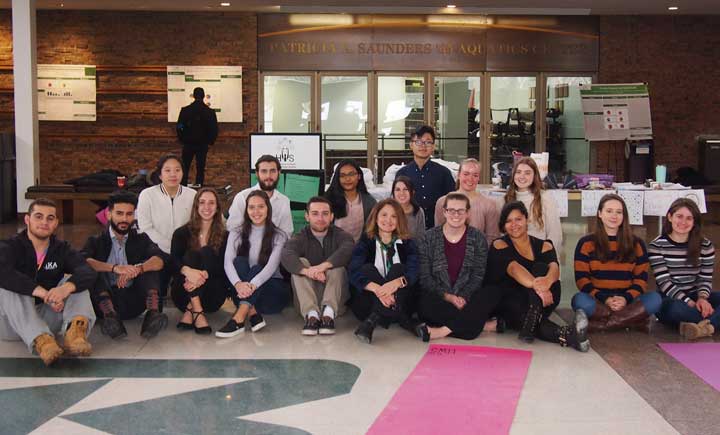Undergrads present Health and Wellness research

More than 60 undergraduate students proudly showed off their research on topics such as diet, sleep, substance abuse and mood during a Health and Wellness Studies (HWS) poster session held Dec. 4 in the West Gym lobby.
The projects were a required research component of the students’ coursework in HWS: 332 Nutrition and HWS 410: Pathophysiology of Nutrition-Related Diseases. Both courses are part of Binghamton University’s Course-Based Undergraduate Research Experience (CURE), a campus initiative that encourages and supports research conducted outside laboratories.
Earlier in the term, students in the courses were asked to identify areas of interest for their research. They were then assigned projects based on their responses. Working in teams of four or five, the 64 students completed 14 projects between the two courses. All the projects consisted of surveys the students conducted online before compiling, analyzing and reporting on the results.
Assistant Professor Lina Begdache teaches both HWS courses that use the CURE methodology and believes the approach is effective for students because it gives them the opportunity to build strong skills they’ll use for the rest of their lives. Additionally, students taking the courses work on all aspects of the research projects, which teaches them the entire research process, compared to students who work only on one component of a project in a lab or in the field.
“CURE courses provide an important undergraduate experience, but it’s challenging for students because they’re learning how to do research for the first time while we’re also covering other course content,” Begdache said. “But, at the end of the course when they have presented their work, they tell me how happy they are with what they’ve produced.”
Begdache said all the students create their own websites where they chronicle their research, writing about the process, their progress and reflecting on their work. Those websites are useful after the students graduate, she added, because they can show them to graduate schools or potential employers.
“It’s so important that we offer experiences to students where they can conduct mentored research,” Begdache said.
“This is a great opportunity for students because it gives them research experience without having to work in a lab for 10 hours a week,” said Joseph Adler, a biology major and HWS minor who was a student in HWS 332 this fall and previously took HWS 410.
The team Adler worked with looked at the effect alcohol and diet have on sleep cycles. He said the team’s hypothesis – that too much alcohol interferes with circadian rhythms and causes sleep problems – was verified through the surveys.
Dazriel Rivera, a dance major and HWS minor, and Paige Hurd, a biology major, were on a team exploring how meal size, frequency and composition affects mood.
“We found a positive correlation between skipping breakfast and feeling stressed,” Rivera said.
Based on their findings, Rivera offered the following advice to students: “Eat small meals throughout the day. Eat your vegetables; they’re good for you! And, don’t forget to eat meat because you need the protein!”
Hurd added, “You have to be aware of the nutrients in food to maintain good health; don’t just think about calories!”
Rivera and Hurd both felt the CURE experience was positive, despite the hard work.
“I liked working in a team. I think it definitely made the process less stressful,” said Hurd.
